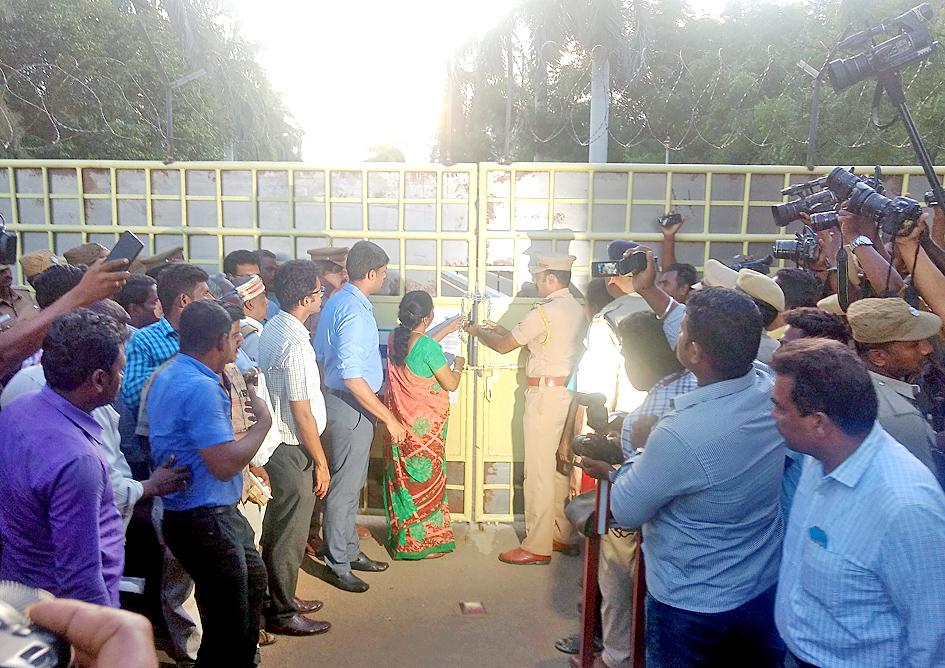India’s oil-to-metals conglomerate Vedanta Ltd yesterday offered to sell a copper smelter complex in southern Tamil Nadu state that was closed four years ago after police opened fire during protests, which culminated in 13 deaths.
Prospective buyers have until July 4 to submit expressions of interest, the company said, without giving financial details.
Vedanta’s 400,000 tonnes per annum copper smelter in the port city of Thoothukudi was ordered closed in May 2018 by the Tamil Nadu government, a week after the deadly protests that sought the plant’s closure for alleged pollution.

Photo: Reuters
The incident, in which 12 protesters were shot dead and one died from other injuries, was condemned by a working group of UN human rights experts for the “excessive and disproportionate use of lethal force by police.”
Vedanta, which has repeatedly denied allegations of the smelter being polluting, has challenged Tamil Nadu’s decision to permanently shut the smelter at the Indian Supreme Court. The smelter was operated by its unit Sterlite Copper.
It is not clear when the Supreme Court will hear the case.
“Interested and financially competent parties shall submit expression of interest along with company profile and other relevant credentials latest” by 6pm on July 4, Vedanta said in a newspaper advertisement.
The company, controlled by billionaire Anil Agarwal, said in March last year that it was looking for a state government partner to set up a new, 100 billion rupees (US$1.28 billion) copper smelter.
The proposed 500,000 tonnes per annum copper smelter could employ as many as 10,000 people, Vedanta said, adding that it was looking for a 405 hectares site close to a port. It is not immediately clear if the proposal received any interest.
Shares of Vedanta fell as much as 10 percent in early trading yesterday to 237.6 rupees, the lowest in more than a year.

Vincent Wei led fellow Singaporean farmers around an empty Malaysian plot, laying out plans for a greenhouse and rows of leafy vegetables. What he pitched was not just space for crops, but a lifeline for growers struggling to make ends meet in a city-state with high prices and little vacant land. The future agriculture hub is part of a joint special economic zone launched last year by the two neighbors, expected to cost US$123 million and produce 10,000 tonnes of fresh produce annually. It is attracting Singaporean farmers with promises of cheaper land, labor and energy just over the border.

US actor Matthew McConaughey has filed recordings of his image and voice with US patent authorities to protect them from unauthorized usage by artificial intelligence (AI) platforms, a representative said earlier this week. Several video clips and audio recordings were registered by the commercial arm of the Just Keep Livin’ Foundation, a non-profit created by the Oscar-winning actor and his wife, Camila, according to the US Patent and Trademark Office database. Many artists are increasingly concerned about the uncontrolled use of their image via generative AI since the rollout of ChatGPT and other AI-powered tools. Several US states have adopted

KEEPING UP: The acquisition of a cleanroom in Taiwan would enable Micron to increase production in a market where demand continues to outpace supply, a Micron official said Micron Technology Inc has signed a letter of intent to buy a fabrication site in Taiwan from Powerchip Semiconductor Manufacturing Corp (力積電) for US$1.8 billion to expand its production of memory chips. Micron would take control of the P5 site in Miaoli County’s Tongluo Township (銅鑼) and plans to ramp up DRAM production in phases after the transaction closes in the second quarter, the company said in a statement on Saturday. The acquisition includes an existing 12 inch fab cleanroom of 27,871m2 and would further position Micron to address growing global demand for memory solutions, the company said. Micron expects the transaction to

A proposed billionaires’ tax in California has ignited a political uproar in Silicon Valley, with tech titans threatening to leave the state while California Governor Gavin Newsom of the Democratic Party maneuvers to defeat a levy that he fears would lead to an exodus of wealth. A technology mecca, California has more billionaires than any other US state — a few hundred, by some estimates. About half its personal income tax revenue, a financial backbone in the nearly US$350 billion budget, comes from the top 1 percent of earners. A large healthcare union is attempting to place a proposal before